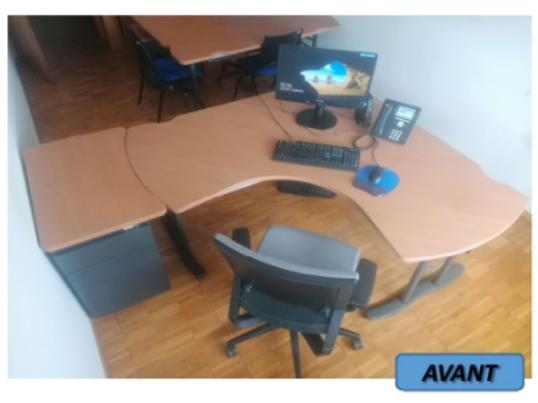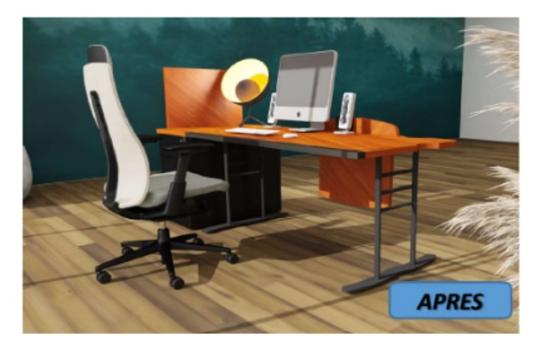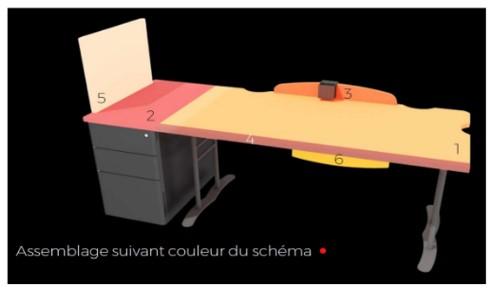Procurement category: furniture.
Environmental and social impacts targeted: circular, zero waste, wellbeing at work.
Relevant EU legislation/policy/guidance: EU GPP criteria on Furniture (2017), A new Circular Economy Action Plan For a cleaner and more competitive Europe (2020).
Background: An ambitious national Law
In 2020, France adopted a landmark law to tackle waste and accelerate the transition towards a circular economy. The Anti-waste and Circular Economy Law has implemented a series of measures to extend the lifespan of most products by promoting eco-design, repairs, reuse, extended producer responsibility (EPR), and improved resource management. The Law also aims to use the 62 billion euros spent annually in France through public procurement as a strategic lever for the transition towards a circular economy. Since 2021, when procuring certain products, public buyers at the national and local level must require that these products contain reused or recycled materials. For instance, 20% of the office furniture procured (as a proportion of the expenditure) in the country now has to include at least 20% of reused, upcycled, or recycled materials.
Not only that the Municipality of Niort already met the target set out in the Law, but by 2022 it had surpassed it. 58% of the furniture that the City of Niort procures comes from reuse or upcycling. This city of around 59,000 inhabitants located in western France, procured refurbished and upcycled desks and storage units. This4-year mixed framework agreement enabled the Niort Town Hall to convert its entire stock of obsolete furniture and to purchase refurbished furniture from the supplier. This approach was supported by the City of Niort’s Sustainable Development Roadmap, which is part of the Niort Durable 2030 political commitment. The roadmap highlights responsible public procurement as a policy lever to promote sustainable consumption patterns. One of its objectives is to implement responsible public procurement policies, develop green and social clauses in line with the Niort Durable 2030 political commitment, and provide training to buyers.
Procurement objectives: ergonomic workstation made from old furniture
Sustainable furniture is designed to last, be kept in use through maintenance and refurbishment, and used and reused over time. When Niort City Hall decided in 2022 to replace the obsolete furniture of 350 of its workstations, the municipality was determined to take a circular approach. As the municipality perceived the new workstations as an investment, they developed the tender so as to acquire new furniture incorporating sustainable development criteria, such as a percentage of recycled material as well as refurbished furniture from the City’s own material bank and the associated logistics operations. The intention was to replace the obsolete furniture over 6 or 7 years until 2026. By dismantling existing equipment to build a material bank, Niort aimed at limiting the environmental impact of its furniture stock. By upgrading the municipal furniture to newer ergonomic standards, it also aimed to improve the health and safety of its municipal workers.
A collaborative process
The process involved extensive consultation with internal stakeholders across the municipality and was validated by the elected representatives responsible for health and safety in the workplace, as well as for sustainable development and public procurement. A team within the municipality, together with the winning bidder was expected to create a prototype of the furniture to match the use made of the old workstations.
Preliminary market consultation
Before launching the call for competition, the City of Niort conducted a market consultation seeking advice from three economic actors in accordance with articles R2111-1 and R2111-2 of the French public procurement code. The aim was to assess the feasibility of each step of the project to ensure they were achievable through a public contract and whether potential suppliers could undertake the required logistical operations (e.g. cleaning, dismantling, storage, transformation, delivery and installation of refurbished furniture).
Once the City of Niort was assured that there were enough potential bidders to ensure a fair competition and meet the future demand, they launched an open call for competition which was published in the Tenders Electronic Daily (TED) the European public procurement journal.
Procurement procedure
The tender was divided into three lots:
- Lot 1 covered the supply of new office furniture;
- Lot 2 the supply of new office armchairs.
Both lots focused the acquisition of new furniture that included green criteria, such incorporating recycled materials in the production of these products.
- Lot 3 focused on second-hand, recycled, reused or transformed furniture made from Niort’s obsolete furniture, in line with the regulatory requirements of the Anti-Waste and Circular Economy Law.
As part of the contract, for all three lots, the suppliers were also asked to delivery, assembly, mounting, and install the furniture. Each delivery provides around ten workstations, and the programme covers about 50 desks a year.
When bidding tenderers were required to:
- Provide plans in 2D and 3D of the layout and installation of the furniture;
- Declare that they would have a warranty on the materials and the parts;
- Demonstrate that they would ensure the technicians, their travels to deliver the furniture and related operations.
To ensure that the furniture was sustainable, tenderers had to declare that furniture under Lot 1 had to be certified “Office Excellence Certified NF OEC” or equivalent. The melamine or laminate worktops had to be labeled at a minimum with “FSC - PEFC or NF-Environment”.
To comply with the Anti-waste and Circular Economy Law, Lot 3 combined both the obligation for economic actors to take back old furniture waste through the VALDELIA scheme (an eco-organisation in charge of the EPR scheme for the collection and recycling waste from non-household furniture) and to make these secondary materials available as a material bank. These secondary materials could then be transformed into new furniture. When delivering the refurbished furniture at Niort City Hall, the winning bidder could then collect old furniture for future transformations. The City also requested a technical document outlining the detailed list of products that will include recycled, second-hand, or refurbished materials, as well as the guarantee length of these products. It also included a requirement for an outline of the operational procedures for the recycling, refurbishment, assembly and logistics for the furniture.
The three lots used a Bill of Quantities (BoQ) and provided up to 50 points to evaluate the price in Lots 1 and 2, and 60 points in Lot 3. The BoQ also considered the eco-design approach of the supplier. The municipality required that the supplier explains how they will manage the furniture waste and reuse the materials (up to 10 points). It also took into consideration the environmental impacts of the packaging used.
The table below outlines the award criteria used in the tendering process:
| Criteria | Weighting | |
| Lots 1 and 2 | Lot 3 | |
| Price | 50 | 60 |
| Technical value | 20 | 20 |
| Environmental value | 10 | 10 |
|
Delivery times, warranty duration of the products from the Bill of Quantities (BoQ), Sustainability of the range |
10 | - |
|
Scope and duration of the warranty for complementary ranges (for lots 1 and 2) of used and/or recycled ranges (for lot 3) |
10 | 10 |
| Total | 100 | 100 |
The tenderer evaluated the quality of the reused materials, the ergonomics of the design, as well as the efficiency of the delivery and assembly of the office workstations and chairs (20 points in Lots 1 and 2).
The contractor and its new upcycling initiative
One company proposed a process for transforming used furniture in accordance with the Anti-waste and Circular Economy Law. The contract was awarded to a furniture retailer which was developing its business model for recycled furniture, and teamed up with a carpenter to carry out the transformations.
In 2021, the contractor, Liere Buro Design, established an upcycling and reconditioning entity called “Encore et Encore” (Again and Again). Its mission is to give a second life to all types of office furniture and upgrade them to new standards and fashions. The team from the Niort City Council's municipal workshops, the Liere Buro Design team and a local carpentry joined forces to breathe new life into the old office furniture. Together, they modeled in 2D prototypes to find the most suitable solution for the new municipal furniture while avoiding furniture waste all together. As a result of this contract and similar projects, Liere Buro Design was awarded the prize for "Best CSR (Corporate Social Responsability) Initiative" in the EBEN 2021 trophy, which rewards initiatives and innovations in sustainable development and quality of life at work in the Office and Digital sector. Encore et encore has since launched multiple projects, to showcase the upcycling possibilities for furniture.
Results: the health and economic benefits
The procurement of refurbished furniture provided several benefits. By upgrading the furniture to new ergonomic standards, the City Hall provided improved working conditions for its staff.
The results were also very positive in economic terms for the local authority and the businesses. For the local authority, the investment budget was halved compared with the purchase of new furniture, as each work station cost €450 instead of €890. For the businesses, this approach has helped to support a virtuous circular economy and upcycling sector. The project has enabled several businesses, including a carpenter and a furniture retailer, to work in partnership to achieve the expected results, and provide value-added.
This project and its results were presented at local, regional and national public buyers forums. This has enabled other public authorities to draw inspiration from the project to develop their sustainable furniture purchasing strategy.
Environmental impacts
The upcycling and circular approach that the City of Niort took meets the regulatory requirements set out in the French Anti-waste and Circular Economy Law. This contract has limited impacts on the environment. Over a period of 4 years, 350 workstations will be transformed into new ones. This contract is enabling a quasi-closed material loop where almost 100% of the materials from the existing municipal furniture are collected and reused. 95% of the materials of the furniture are recycled and made available in a material library that can be then used for the conversion of new workstations. The transformation does not integrate new raw materials except for specific fittings and fastening elements for assembly.
As the municipality is procuring refurbished furniture in Lot 3 for their standard workstations, not only it has limited the consumption of virgin raw materials, it also reduces CO2 emissions associated with the transport and manufacturing of materials such as wood panels, metal and plastics. The contract also led to a significant reduction in non-recyclable waste. The refurbishment and upcycling of the old municipal furniture avoided that at least 50% of the volume of the furniture be sent to landfill. Laminated trays, solvents, VOCs, glues and plastics contained in certain furniture can contaminate recycling processes and are therefore not always recyclable.
Lessons learned
The Anti-waste and Circular Economy Law has set France on a transition towards a circular economy and encourages public procurers to adopt a circular approach to procurement. Adopting a circular approach can not only reduce environmental impacts, it can also provide value-for-money and improve wellbeing. Having an enabling legislative framework can have ripple effects.
The preliminary market consultation approach that the Municipality of Niort took has ensured that the approach based on reuse is doable and feasible and can support multiple objectives such as ensuring health and safety at work.
This example illustrates that public procurement can be used strategically to enable the transition towards a circular economy, by promoting quasi-closed material loops, limit waste, reduce transportation needs and the impacts of manufacturing.
By moving away from the standard way of procuring furniture and being open to experimenting with a new approach, the Municipality not only meets its needs but also is supporting its sustainability goals. It also encouraged businesses to develop innovative solutions to reduce waste and adopt new business models. This example also demonstrates that the market is ready to adopt new practices.
More information
For related information, please see the European GPP criteria for Furniture and the Technical Background Report.
Tender documents are available online.




